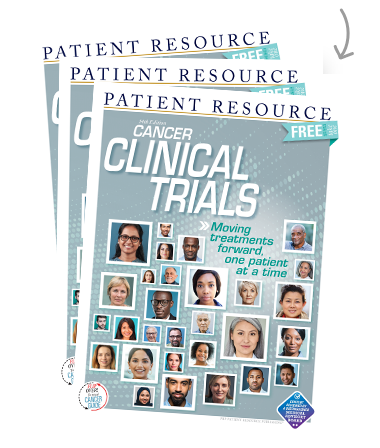Clinical Trials
Introduction
Clinical trials are a critical component of cancer research. Most of the advances made in treating cancer today were once therapies or procedures that were developed, tested and evaluated through the clinical trials process to gain approval from the U.S. Food and Drug Administration (FDA). The ultimate goal is to help you and the entire cancer community enjoy longer, healthier lives.
These highly regulated research studies rely on volunteers to help doctors search for new and better ways to prevent, diagnose, treat and cure cancer. Regardless of where you are in the continuum of care – newly diagnosed or ready for a new option – clinical trials offer possible access to state-of-the-art treatments. And, by participating, you will be a partner in cancer research, helping improve treatments for future patients.
It is a good idea to bring up the topic of clinical trials early in your care, especially if your doctor does not mention it first. Your medical team will guide you through the process if a clinical trial is the next step. You can even help search for clinical trials on your own.
As with any cancer treatment, those used in clinical trials present potential risks and extra time commitments. Ask your doctor about possible side effects and the schedule to accommodate the tests and appointments that are required for the trial.
Areas of Research
Clinical trials explore treatment and non-treatment strategies, such as disease prevention, patient screening, diagnostic tools and procedures, genetic risk factors and lifestyle/behavioral changes. Many trials incorporate measures to improve quality of life.
Therapeutic Treatments
Most people are familiar with this type of clinical trial that tests a new medical approach. These treatments may include new drugs, drug combinations, surgeries, medical procedures or devices. Recently, a great deal of focus has been on the identification of therapies that treat cancers with specific biomarkers. Research is also ongoing to find treatments for cancers that do not exhibit a biomarker for a specific mutation.
Disease Prevention and Patient Screening
Designed to evaluate one or more ways to identify or diagnose a particular disease or condition, these trials also find ways to prevent the initial development or recurrence of a disease or condition. These can include medicines, vaccines or lifestyle changes, among other approaches.
Diagnostic Tools and Procedures
These trials are conducted to examine new and improved methods for identifying a condition or the risk factors for that condition.
Genetic Risk Factors
Researchers seek to learn more about the genetic disorders and disease-related mutations that cause various types of cancer.
Lifestyle/Behavioral Changes
These trials are designed to explore and measure ways to make people more comfortable as they manage a chronic condition. Some of the studies test the effect lifestyle changes have on lowering the risk of cancer and on current cancer treatments.
Clinical trials need a wide variety of participants
Doctors understand that people can experience the same disease differently because each patient is biologically and genetically unique. It is vital that new medications are tested in clinical trials where participants reflect real-world populations to get a clear understanding of the drug’s safety and efficacy. For everyone to get the most benefit from cancer research, volunteers from many different backgrounds and life experiences are necessary. Volunteers of all ages, genders, locations, races and ethnicities, weights, sexual orientations and socioeconomic groups are needed.
Recent studies have shown that the quality of research increases when the volunteers come from diverse groups because different life experiences add valuable perspectives to these projects.
Many factors influence how people react to certain drugs, medical devices and treatment plans. Therefore, drawing from a diverse pool of volunteers allows researchers to use science-driven strategies to determine which therapies are best for specific groups of people. This research can also take into account how a therapy works in people who are at higher risk for certain conditions such as heart disease and diabetes.
The rise of precision medicine is also driving the need for more specific information about the potential users of certain types of therapy so that treatments can be tailored for them and their condition. Precision medicine uses information about a person’s own genes or proteins to prevent, diagnose and/or treat disease.
Following are additional benefits of including more diversity within clinical trials:
- Reduces biases
- Promotes health equity
- Contributes to producing innovative treatments
- Improves public perception about clinical trials
- Builds public confidence about participating
Progress is being made to include a wider variety of people in clinical trials. This is due in part to new guidelines and strategic plans, which are encouraging scientists and clinical trial planners to include more diverse groups of people in research.
The National Institutes of Health Revitalization Act of 1993 was signed into law to establish guidelines to include women and persons from racial and ethnic minority populations in clinical research. More recently, the National Institutes of Health Minority Health and Health Disparities Strategic Plan 2021-2025 was created to address disparities in health care. This patient-centric approach to cancer research will help bring new and improved therapies to the populations that will be using them to live longer.



